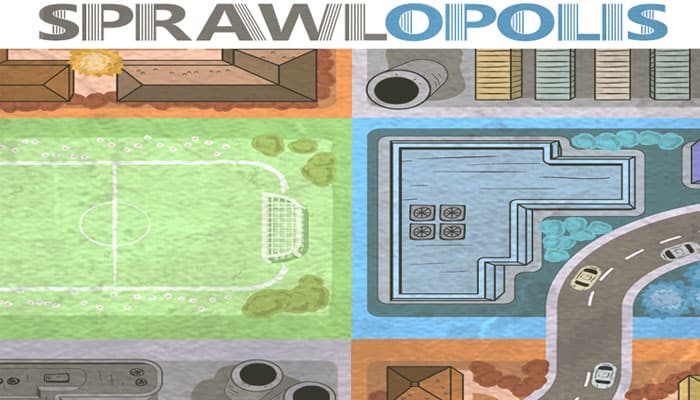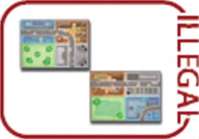
You and your fellow city planners have been hired to develop the ultimate sprawling metropolis!
Together you must build a city that keeps the officials happy... and they've got some pretty specific requirements. You'll need to plan carefully if you want to meet their lofty expectations!

Components
- 18 cards with blocks and scoring conditions
- Instructions
Setup
-
Shuffle the cards and randomly set 3 off to the side with their scoring conditions face up.
These 3 cards show the specific conditions that apply to this game. Ignore the scoring conditions on the backs of all other cards.
Each of the scoring condition cards has a unique number on it. Add these three num- bers together. This gives the Target Score (the total points your team must reach or exceed in order to win).
-
Choose a start player and deal them 3 cards, keeping their "blocks" side face down. Deal 1 face-down card to all other players. Take your card(s) into your hand without revealing the "blocks" side to your fellow builders.
-
Set the remaining cards off to the side with the "blocks" side face up to form the draw deck. Note that this gives all players a preview of the top card in the deck.
-
Place the top card of the deck into the Build Area to start your city.
-
5. Play begins with the start player and continues clockwise.
Two Player Example Setup:

Blocks
A "block" is defined as a rectangular quadrant in one of four zone types: commercial (blue), park (green), industrial (grey), and residential (orange). Each card has four blocks in each of the four zone types.
Roads
Each card contains either one or two roads. A "road" is defined as a continuous stretch of roadway that may be as short as one block long (before it dead ends at a block edge or the edge of the city) or several blocks long. Roads play an important role in your final scoring, as well as certain scoring conditions.
Building The City
If you are the start player, choose 1 of your 3 cards in hand, reveal it and add it to the city with the block side face up. After playing your card, pass your 2 remaining cards to your left neighbor. They now have 3 cards in hand and become the start player for the next turn.
Finally, draw the top card from the deck so that you have 1 card in hand. If there are no more cards in the deck, continue playing with an empty hand. If you have fewer than 2 cards to pass when your turn is over, pass the remaining cards you have.
Continue until all 15 cards have been added to the city.
Placement Rules
On your turn, you must place a card so that at least one block edge meets an existing block edge OR you may place your card so that it aps or covers a block (or multiple blocks) your new card.

You may NOT tuck a card under a card in your city.
You may NOT place a card so that it only connects to your city by a corner.
When placing a card, you may rotate it 180 degrees, but you must place the card horizontally.
Creating an open space or gap in your city is allowed, so long as you adhere to the above placement rules.

Table Talk
Discussing cards is not only legal, but encouraged! Players may discuss anything they want, but they can't show their hand to anyone. Once you choose your card and reveal it, you must play it. But feel free to discuss placement!
End of the Game
When all 15 cards have been played, your city is complete! Tally your team's final score:
Blocks: Your team scores 1 point per block in your largest group of each zone type. A "group" is a cluster of matching blocks connected by at least one edge. Only your largest group of each type is scored. If 2 or more groups of the same type are tied for your largest, you choose which group to score.
Roads: Your team subtracts 1 point from your total score for each road in your city. Remember, a "road" is defined as a continuous stretch of a roadway.
Scoring Conditions
In addition to your base scoring, you also score points for each of the 3 cards you placed off to the side. Each has a unique scoring condition. It is possible to lose points rather than gain points with some conditions.
Add the total of your block groups, subtract the total of your roads, and add/subtract any points earned from your scoring condition cards to get your final score. If this final score equals or exceeds the combined value of your 3 scoring condition cards, you win!
The block groups would score: Commercial 2, Industrial 2, Parks 4 and Residential 3 for a total of 11 points for BLOCK scoring.
You have 7 roads for a total of -7 points for ROAD scoring. This leaves you 4 points as your base score. (11-7 = 4)
Next, tally all points from your three scoring conditions and add this to your base score to get your I FINAL score. If it equals or exceeds your Target Score, you win!
Solo Play
Play is identical to the cooperative game, except you have one hand of 3 cards to work with each turn.
After placing a card, draw a new card so that you have 3 cards and take your next turn. If there are no more cards in the deck, play until you run out of cards.
Scaling Difficulty
Easier Game - Do not lose points for roads. Harder Game - You only score for the largest block group of one zone type.
Continue Reading

